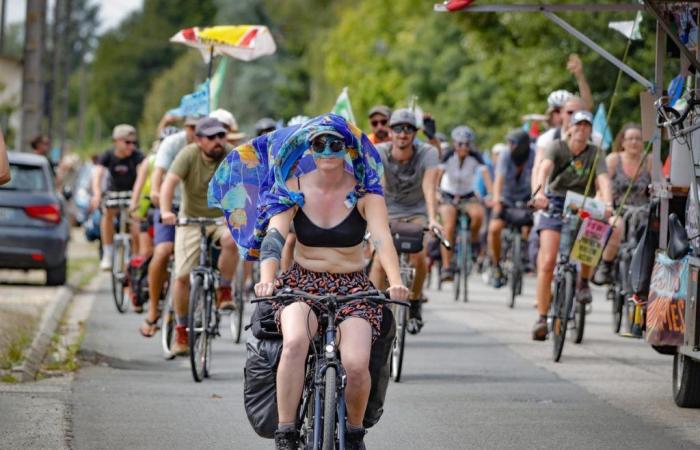The full-throated protest against the basins is back. Nearly a year after the “water convoy” between Lezay (Deux-Sèvres) and Paris, sixteen months after the astonishing violence that drowned the demonstration in Sainte-Soline – a handful of kilometers from Lezay – on March 24, 2023, opponents of the mega-basins intend to massively regain their footing in…
The full-throated protest against the basins is back. Nearly a year after the “water convoy” between Lezay (Deux-Sèvres) and Paris, sixteen months after the astonishing violence that drowned the demonstration in Sainte-Soline – a handful of kilometers from Lezay – on March 24, 2023, opponents of the mega-basins intend to massively regain a foothold in Poitou-Charentes. Bassines Non Merci, the collective that coordinates actions against these reservoirs built for irrigation needs, plans to set up a water village from July 16 to 21 on the outskirts of Melle, still in Deux-Sèvres.
Two events stand out: July 19 and 20, announced as “days of action to make the basins and the agro-industrial sector in Poitou visible and targeted,” according to the movement’s spokespersons, who held a press conference on July 2. Where exactly? We won’t know more immediately. From the Vienne to the Poitevin marsh to the agricultural plains of Charente-Maritime, the range is wide.
Deux-Sèvres: against the mega-basins, a mega-convoy by bike
Several hundred opponents of the basins set off by bike from Lezay, in Deux-Sèvres, to rally the Loire-Bretagne Water Agency in Orléans and ask it to stop public funding for these water reservoirs designed for agricultural needs.
What is the State’s response?
Supported by organizations such as the Confédération paysanne, Attac, the Nouveau Parti anticapitaliste (NPA) and the union Solidaires, Bassines Non Merci relies on the municipality of Melle, which makes the communal land available. On the other hand, the collective has not yet declared the demonstrations of July 19 and 20. “We must do it at least three days before,” recalls Julien Le Guet, one of the spokespersons of the collective. We remember that they had been banned in Sainte-Soline on October 29, 2022 and March 24, 2023, the two high points against the construction of a basin in the village. In both cases, the considerable deployment of law enforcement to prevent access to the site and the virulence of some of the opponents had triggered the escalation.
Unless you live on the planet Mars, it has escaped no one that the political context of this third week of July risks being notably different. “We decided more than six months ago to organize a gathering of international scope. But we had not imagined this madness [la dissolution, NDLR] from Macron. We are facing the imminent risk of a brown government. In these circumstances, we expect state services to play their role: respect for fundamental freedoms. The right to gather, the right to demonstrate. We are going to experience an eminently political event. We will have to keep solidarity alive in a much more oppressive context,” insists Julien Le Guet.
However, the main reason for the fight is not lost sight of. “Behind the basins, it is the question of the agricultural model that is posed. The only possible way is to share water,” argues Nicolas Fortin, the secretary general of the Confédération paysanne. Opponents denounce the very principle of these large installations, which pump water from the water tables in winter. They champion an agroecology that allows the soil to retain water.







